A Quote by Prince Philip
If anything, I've thought of myself as Scandinavian. Particularly, Danish. We spoke English at home.
Quote Topics
Related Quotes
I have a funny relationship to language. When I came to California when I was three I spoke Urdu fluently and I didn't speak a word of English. Within a few months I lost all my Urdu and spoke only English and then I learned Urdu all over again when I was nine. Urdu is my first language but it's not as good as my English and it's sort of become my third language. English is my best language but was the second language I learned.
A dash derives from "to dash," to shatter, strike violently, to throw suddenly or violently, hence to throw carelessly in or on, hence to write carelessly or suddenly, to add or insert suddenly or carelessly to or in the page. "To dash" comes from Middle English daschen, itself probably from Scandinavian-compare Danish daske, to beat, to strike. Ultimately the word is-rather obviously-echoic.







































